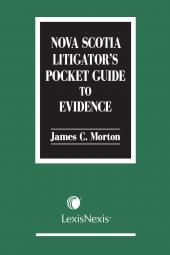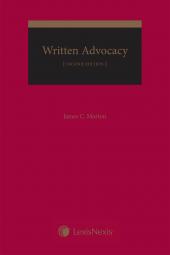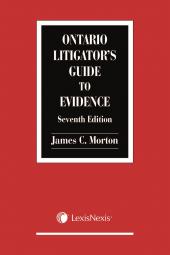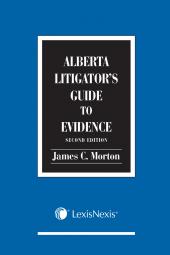Nova Scotia Litigators Pocket Guide to Evidence
One Year Subscription Only Terms
Subscribers receive the product(s) listed on the Order Form and any Updates made available during the annual subscription period. Shipping and handling fees are not included in the annual price.
Subscribers are advised of the number of Updates that were made to the particular publication the prior year. The number of Updates may vary due to developments in the law and other publishing issues, but subscribers may use this as a rough estimate of future shipments. Subscribers may call Customer Support at 800-833-9844 for additional information.
Subscribers may cancel this subscription by: calling Customer Support at 800-833-9844; emailing customer.support@lexisnexis.com; or returning the invoice marked 'CANCEL'.
If subscribers cancel within 30 days after the product is ordered or received and return the product at their expense, then they will receive a full credit of the price for the annual subscription.
If subscribers cancel between 31 and 60 days after the invoice date and return the product at their expense, then they will receive a 5/6th credit of the price for the annual subscription. No credit will be given for cancellations more than 60 days after the invoice date. To receive any credit, subscriber must return all product(s) shipped during the year at their expense within the applicable cancellation period listed above.
Product description
Nova Scotia Litigator's Pocket Guide to Evidence provides instant solutions to common and unfamiliar evidentiary problems that can arise in civil, criminal, family or administrative proceedings. Difficult concepts are simplified for easy understanding and instant use in court. The author takes the common law and the provincial and federal evidence acts to their essentials. This book deals with all areas of the law of evidence and is complete with the latest guidance from the Supreme Court of Canada.
Written by James C. Morton, Past-President of the Ontario Bar Association, and a well-known litigator and lecturer, this book includes full coverage of the Nova Scotia Evidence Act and is fully indexed to the specific sections of the Act, enabling the reader to easily locate a topic not only in the text, but in the Act itself.
Seeking the admissibility of testimony or a document, challenging the credentials of a proposed "expert" witness, or encountering other thorny evidentiary issues in the heat of the action should not require a lengthy adjournment. You simply need a portable and authoritative reference to resolve problems as they arise.
Answering the Key Questions
Nova Scotia Litigator's Pocket Guide to Evidence specifically addresses a wide range of issues, including:
- What is the difference between relevance and materiality?
- When must opposing witnesses be cross-examined?
- How has the case by case (Wigmore) exception to the hearsay rule been applied by the courts?
- How broad is the right to silence?
- What is the current rule for admitting wiretap evidence?
- What are the limits on solicitor-client privilege?
- To what extent can you impeach your own witness?
- When can a prior inconsistent statement be introduced?
Essential Features for Legal Professionals
9780433464983
You'll be amazed at how much vital information can be found in such a small package. Stripping the common law and the provincial and federal evidence acts to their essentials, this book manages to be:
- Easy to use - highlights the basic principles and leading cases on particular points
- Practical - offers a recommended pattern of questions and answers for use in direct and cross-examination, and a step by step approach for resolving admissibility issues
- Wide ranging - 21 chapters canvass all the major problem areas in evidence, drawing on leading Canadian and Commonwealth decisions
- Portable - its convenient size is ideal for reference in court or in meetings
- Up to date - reflects the latest Supreme Court of Canada decisions
- Reliable - written by a leading litigator who also teaches evidence law
9780433464983
Table of contents
Chapter 1: Fundamental Principles
Chapter 2: The Justice System
Chapter 3: Appeals and Evidentiary Review
Chapter 4: Onus, Burden and Presumption
Chapter 5: Testimonial Evidence
Chapter 6: Examining Witnesses
Chapter 7: Hearsay
Chapter 8: Exemptions to the Hearsay Rule
Chapter 9: Exclusion of Otherwise Relevant Evidence
Chapter 10: Confessions
Chapter 11: Evidence Obtained Illegally
Chapter 12: The Exclusion Remedy Generally
Chapter 13: Protection of Confidential Relations
Chapter 14: Opinion Evidence
Chapter 15: Evidence of Character
Chapter 16: Similar Fact Evidence and Credibility
Chapter 17: Credibility
Chapter 18: The Best Evidence Rule
Chapter 19: Family Law
Chapter 20: Administrative Proceedings
Chapter 21: Forensic Evidence
Appendix I: Canada Evidence Act
Appendix II: Evidence Act (Nova Scotia Version)
 Lexis Nexis
Lexis Nexis 


